Isn’t the traditional soap put aside in favor of the shower gel? Isn’t it almost hidden on the shelves? Both soap and body wash have many benefits, but beware!
It all depends on your skin type and especially on the quality of your product. It is recommended to check its composition before use. This article sheds light on the subject and gives you some sound advice to decide; shower gel or soap, which will fit in your bathroom?
Which soap for which skin?
Some differences between soap and shower gel
Toilet soap can be found commercially in different forms and this is to satisfy all skin types, even the most delicate.
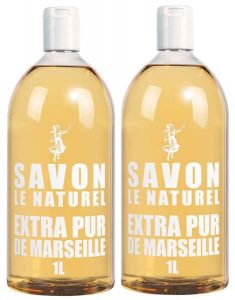 Traditional soap contains animal or vegetable fats as well as minerals such as potash and soda. Liquid soap contains more water. Traditional Marseille soap comes in liquid soap. It is actually more diluted.
Traditional soap contains animal or vegetable fats as well as minerals such as potash and soda. Liquid soap contains more water. Traditional Marseille soap comes in liquid soap. It is actually more diluted.
Shower gel has the advantage of having a pH close to that of the epidermis. It is gentler on the skin. For this reason, it is suitable for dry or irritated skin, as it is less aggressive than traditional soap. Nevertheless, the composition of shower gels is difficult to decipher. It happens that some shower gels dry out the epidermis or even cause allergies.
Superfatted and dermatological soap
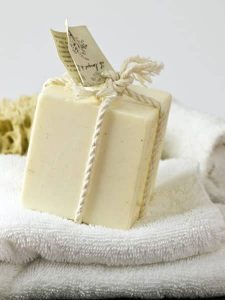 Almond oil or shea butter is added into the superfatted soap. The latter is recommended for oily-prone skin and mature skin.
Almond oil or shea butter is added into the superfatted soap. The latter is recommended for oily-prone skin and mature skin.
Dermatological or “soap-free” soap contains synthetic agents that clean just as effectively as traditional soap. The dermatological bar is recommended for the most sensitive skin.
Soap or shower gel, privilege natural in both cases. But deciphering labels is rarely obvious. Also, remember that less can be more. The simpler and clearer the composition, the more likely your product will be safe for your body.
The benefits of soap with conditions!
Without wanting to promote soap, we can’t deny that it is more cleansing than shower gel. It washes the pores deeply and prevents bacteria from developing.
Moreover, soap is easy to rinse. After the shower, the skin then dries faster. Soap ensures the best hygiene for your body.
Unlike shower gel, real soaps such as Marseille or Aleppo soap do not contain additives.
However, can you identify a real soap?
Marseille soap
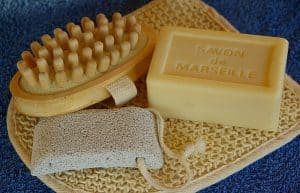 The soap from Marseille benefits from a appellation d’origine contrôlée and contains more than 70% vegetable oil.
The soap from Marseille benefits from a appellation d’origine contrôlée and contains more than 70% vegetable oil.
On the label, it will be easy for you to spot the sodium olivate which corresponds to olive oil or the sodium cocoate which is copra oil from the coconut.
You will find cream colored (copra) or green (olive) Marseille soaps.
Aleppo soap
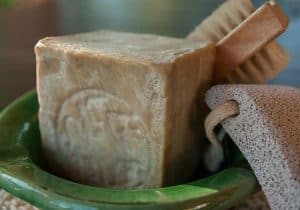 The Aleppo soap contains over 70% olive oil as well as about 15% bay leaf oil.
The Aleppo soap contains over 70% olive oil as well as about 15% bay leaf oil.
The natural soap from Aleppo is handcrafted from olive and bay leaf oils.
It has a neutral pH and is fragrance and paraben free.
It is perfect for baby and sensitive skin.
Black Soap
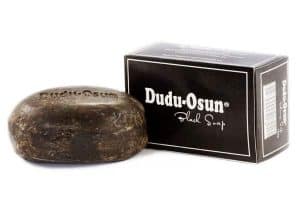 Rich in vitamin E, the cosmetic black soap is also known for its purifying power and exfoliating qualities.
Rich in vitamin E, the cosmetic black soap is also known for its purifying power and exfoliating qualities.
It rids the epidermis of dead cells and other impurities.
Also, the pH of 5 in black soap makes it non-harmful to the skin, unlike many soaps made with sodium hydroxide or soda.
Black soap is concentrated, so remember to dilute it with water before applying.
Generally speaking, it is recommended to prefer soaps based on vegetable oils such as olive, almond or even palm oils. Synthetic substances known as surfactants and animals should be avoided. Also beware of perfumes that can be a source of irritation for the skin. Dyes and preservatives are not supposed to be present in a traditional soap. Don’t hesitate to take a look at the label.
Our latest tips for better hygiene
Good to know
Be aware that soap can irritate the skin. Nevertheless, the temperature and the limescale of the water are not innocent either. Moisturizing your skin after your shower is essential. Moisturizers or oils such as argan oil are ideal for smoothing and softening the epidermis.
Also, the washcloth is not recommended: it remains wet for long hours and poorly rinsed. Bacteria tend to grow there. Prefer your hands!
When making your choice, consider organic cosmetics. These carry certification labels. These products are based on natural ingredients and their effectiveness is equivalent to that of conventional soap. Plant-based soaps such as those with Calendula are great for the skin.
Make your own soap
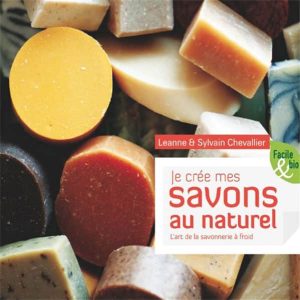 Have you ever made your own soaps?
Have you ever made your own soaps?
The book I create my soaps naturally by Leanne and Sylvain Chevallier will perhaps convince the most chilly among us!
The author couple walks you through simple cold process soap making techniques.
The recipes are free of dyes and fragrances and are illustrated.
The result is natural and moisturizing.
In brief
Faced with this variety of soaps and shower gels, the wisest thing to do is to get to know your skin, to opt for a soap that suits it and is as natural as possible.
Soap is undoubtedly more economical than shower gel. More diluted, shower gel tends to be consumed more quickly. Nevertheless, shower gel is more practical, especially when travelling. Its hermetic container is easily transportable.
Also, the composition of soap is often more natural. As we have seen, the vegetable soap bar is ideal for sensitive skins and hydrates the most fragile skins.
